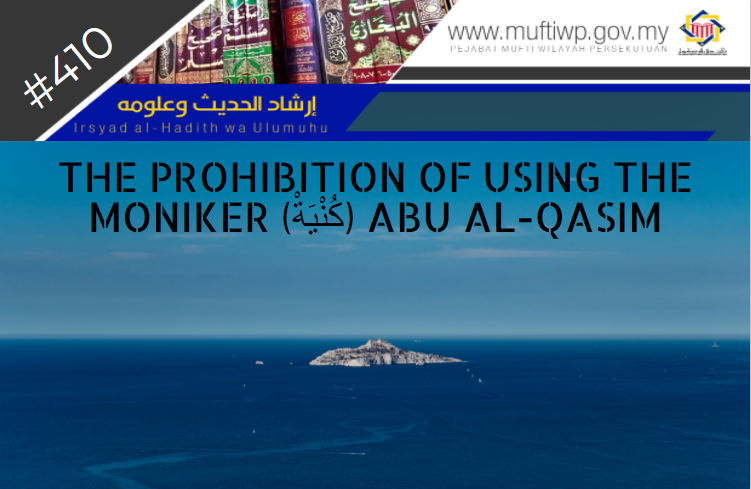Question:
Assalamualaikum SS Mufti. What is the meaning of this hadith?
تَسَمَّوْا بِاسْمِي وَلاَ تَكْتَنُوا بِكُنْيَتِي
"Name yourselves after me, but do not call yourselves by my Kuniya."
Answer:
Waalaikumussalam wrt wbt,
Alhamdulillah, praise and thanks to Allah for the countless blessings He has blessed us all with. Blessings and salutations to the Prophet Muhammad PBUH, his wives, his family, companions and all those that follow his teachings to the day of judgement.
In our previous articles, we state that it is one of the sunnah of the Prophet PBUH to use a moniker (كُنْيَةْ). However, this sunnah is rarely practiced in our today’s society, unlike in the Arabic countries. Kuniya or a moniker or nickname begins with the word Abu for men and Ummu for women.
According to the above question, the hadith is a sahih hadith narrated by Imam al-Bukhari in his Sahih in the chapter of people who lie in the name of the Prophet PBUH which is the 110th hadith and also mentioned in the chapter of nickname or kuniya of the Prophet PBUH of hadith 3538. Furthermore, the hadith is also narrated by Imam Muslim in his sahih in the chapter of prohibition of using the moniker Abu al-Qasim hadith number 2133.
Imam Ibn Hajar al-Asqalani cited the words of Imam al-Nawawi where scholars have differing opinions in the usage of the moniker Abu al-Qasim into three opinions:
- Absolute prohibition regardless of whether his name is Muhammad or otherwise. This is thabit from Imam al-Syafie.
- Absolute permissibility and the prohibition were only applicable during the time of the Prophet PBUH.
- Prohibited for a person named Muhammad and permissible for a person not named Muhammad. This is the opinion of al-Rafi’ie and it is as though the accurate opinion for this is applied by people.
Imam al-Nawawi further said, the third opinion contradicts the literal meaning of the hadith. While, the actions of people supported the second opinion as though they based it for what happens in the hadith of Anas:
كَانَ النَّبِيُّ صَلَّى اللهُ عَلَيْهِ وَسَلَّمَ فِي السُّوقِ، فَقَالَ رَجُلٌ: يَا أَبَا القَاسِمِ، فَالْتَفَتَ إِلَيْهِ النَّبِيُّ صَلَّى اللهُ عَلَيْهِ وَسَلَّمَ، فَقَالَ: إِنَّمَا دَعَوْتُ هَذَا، فَقَالَ النَّبِيُّ صَلَّى اللهُ عَلَيْهِ وَسَلَّمَ: سَمُّوا بِاسْمِي وَلاَ تَكَنَّوْا بِكُنْيَتِي
While the Prophet (ﷺ) was in the market, somebody, called, "O Abul-Qasim." The Prophet (ﷺ) turned to him. The man said, "I have called to this (i.e. another man)." The Prophet (ﷺ) said, "Name yourselves by my name but not by my Kunya (name)." (In Arabic world it is the custom to call the man as the father of his eldest son, e.g. Abul-Qasim.)
Sahih al-Bukhari (2120)
Thus, it is understood from the speech of the Prophet PBUH that the prohibition is specific during the time when the Prophet PBUH is still alive and the reason for the restriction is no longer applicable after the Prophet PBUH’s death. (See: Fath al-Bari, 10/572)
Dar al-Ifta’ Jordan issued an opinion that it is not a problem for a person to name his son Qasim or al-Qasim for there is no evidence that prohibits it. However, for our madhhab (madhhab al-Syafie) the usage of the moniker Abu al-Qasim is prohibited and this is the final opinion in madhhab al-Syafie. Thus, he has to choose another nickname for himself or another name of his son’s and it does not necessarily be the eldest son.
However, we are inclined towards the opinion of the majority of the salaf, jurists and scholars who ruled it permissible to use the moniker of “Abu al-Qasim” for the prohibition is abrogated after the death of the Prophet PBUH. This is also the opinion of Imam al-Nawawi as stated by Imam al-Khatib al-Syarbini in his book. (See: Mughni al-Muhtaj, 1/101)
Conclusion
To conclude, the hadith mentioning the prohibition of the usage of the moniker is sahih (muttafaqun ‘alaih) for it is narrated by Imam al-Bukhari and Imam Muslim. Furthermore, it is permissible to use the moniker “Abu al-Qasim” according to our above explanation. Lastly, may Allah SWT give us all understanding in this religion for us to practise and convey to others. Amin
Wallahu a’lam.


